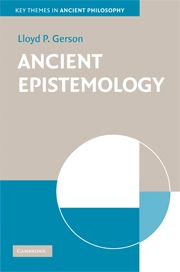Book contents
4 - Aristotle
Published online by Cambridge University Press: 05 June 2012
Summary
INTRODUCTION
Discussions of Aristotle's epistemology typically begin with the explicit or implicit assumption that, owing to his rejection of Plato's theory of Forms, Aristotle's thinking about knowledge and the objects of knowledge must be fundamentally different from Plato's. Indeed, if Forms do not exist, and if the motivation for radically separating knowledge and belief is just that cognising Forms is entirely different from cognising sensibles, that motivation is evidently not going to be shared by Aristotle. And yet Aristotle does repeatedly say, for example, that there is no knowledge of the objects of belief. He even maintains that there is no knowledge ‘by means of sense-perception’. So, one may well wonder whether Plato's point about the separation of knowledge and belief is a point that depends on a theory about Forms as opposed to a theory about the difference between what is intelligible and what is sensible generally. In the latter event, it is all the more interesting if it turns out that Aristotle – despite his substantial disagreements with Plato – agrees with his master's basic epistemological doctrines.
A terminological note is in order. In Republic as we have seen, Plato initially uses the term epistēmē for the two modes of cognition – noēsis and dianoia – in the top part of the Divided Line. He corrects this later on and limits the use of epistēmē to the highest portion, reserving the term noēsis for both.
- Type
- Chapter
- Information
- Ancient Epistemology , pp. 62 - 89Publisher: Cambridge University PressPrint publication year: 2009



